What are the harms and benefits of mangoes for a woman’s body?
Mango means “great fruit” in Sanskrit. 100 g contains twice as much ascorbic acid as lime, and this amount covers the daily requirement by 40%. Due to its rich chemical composition, this fruit can help in the prevention and treatment of certain diseases, as well as in the fight against excess weight.
Chemical composition and properties of mango
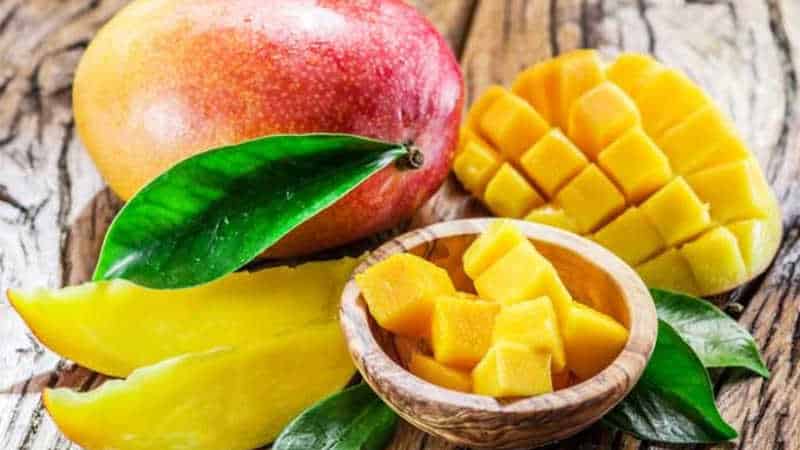
Mango is a rich source of vitamins, micro- and macroelements, various amino acids.
| Vitamins | Quantity | % of daily value in 100 g |
| Retinol | 54 mcg | 6% |
| Alpha carotene | 9 mcg | |
| Beta carotene | 0.64 mg | 12,8% |
| Cryptoxanthin | 10 mcg | |
| Lycopene | 3 mcg | |
| Lutein + Zeaxanthin | 23 mcg | |
| IN 1 | 0.028 mg | 1,9% |
| AT 2 | 0.038 mg | 2,1% |
| AT 4 | 7.6 mg | 1,5% |
| AT 5 | 0.197 mg | 3,9% |
| AT 6 | 0.119 mg | 6% |
| AT 9 | 43 mcg | 10,8% |
| WITH | 36.4 mg | 40,4% |
| E | 0.9 mg | 6% |
| TO | 4.2 mcg | 3,5% |
| RR | 0.669 mg | 3,3% |
| Macronutrients | ||
| Potassium | 168 mg | 6,7% |
| Calcium | 11 mg | 1,1% |
| Magnesium | 10 mg | 2,5% |
| Sodium | 1 mg | 0,1% |
| Sulfur | 8.2 mg | 0,8% |
| Phosphorus | 14 mg | 1,8% |
| Microelements | ||
| Iron | 0.16 mg | 0,9% |
| Manganese | 0.063 mg | 3,2% |
| Copper | 111 mcg | 11,1% |
| Selenium | 0.6 mcg | 1,1% |
| Zinc | 0.09 mg | 0,8% |
| Essential amino acids | ||
| Arginine | 31 mg | |
| Valin | 42 mg | |
| Histidine | 19 mg | |
| Isoleucine | 29 mg | |
| Leucine | 5 mg | |
| Lysine | 66 mg | |
| Methionine | 8 mg | |
| Threonine | 31 mg | |
| Tryptophan | 13 mg | |
| Phenylalanine | 27 mg | |
| Nonessential amino acids | ||
| Alanin | 82 mg | |
| Aspartic acid | 68 mg | |
| Glycine | 34 mg | |
| Glutamic acid | 96 mg | |
| Proline | 29 mg | |
| Serin | 35 mg | |
| Tyrosine | 16 mg | |
| Saturated fatty acids | ||
| Saturated fatty acids | 92 mg | |
| Lauric | 1 g | |
| Myristic | 13 g | |
| Palmitic | 0.07 g | |
| Stearic | 4 g | |
| Monounsaturated fatty acids | 0.14 g | 0,8% |
| Palmitoleic | 0.067 g | |
| Omega-9 | 0.075 g | |
| Polyunsaturated fatty acids | 0.071 g | 0,6% |
| Linoleic | 0.019 g | |
| Linolenic | 0.051 g | |
| Omega-3 | 0.051 g | 5,7% |
| Omega-6 | 0.019 g | 0,4% |
Beneficial properties of mango:
- Strengthens the immune system. Contains vitamin C, zinc, selenium, omega-3 fatty acids, which support the functioning of the immune system and promote rapid recovery.
- Improves the functioning of the digestive system. Due to its high fiber content, it relieves constipation and increased gas formation.
- Helps restore the functioning of the nervous system. B vitamins help reduce stress and increase performance.
- Improves vision. Vitamin A, zeaxanthin and lutein prevent the development of night blindness, inhibit the progression of myopia, and protect the retina from damage.
- Improves the functioning of the cardiovascular system. Potassium ensures proper functioning of the heart muscle, strengthens blood vessels, and normalizes blood pressure.
- Increases sexual desire. Due to the presence of vitamin E, the production of sex hormones is normalized and libido is enhanced.
- Supports brain activity. Iron, vitamin B6 and glutamic acid preserve cognitive activity of the brain and improve memory.
- Restores bone health. Vitamin C promotes collagen production, and the substance lupeol fights arthritis and joint inflammation.
- Protects against the development of anemia. Iron in combination with vitamin C is well absorbed, and the risk of anemia is reduced.
- Positively affects the genitourinary system. Due to the diuretic effect, sand is washed out of the kidneys and bladder, and stones do not form.
- Normalizes cholesterol levels due to the high content of pectin, vitamin C and fiber.
- Improves skin condition. Vitamins A, E, C and omega-3 acids improve the condition of the skin from the inside when eating mango, and masks based on this fruit cleanse the pores and give the face freshness.
- Quickly satisfies hunger and helps you lose weight. Fiber improves digestion and promotes fat burning.
- Helps avoid heatstroke in hot weather. A cocktail of ground fruit pulp mixed with water and sugar quickly cools the body.
Mango has an antipyretic effect and can be consumed during a cold or acute respiratory infection, which is accompanied by an increase in temperature.
Calorie content and BZHU
100 g of mango contains 60 kcal, which is 3.9% of the daily intake of an adult.
BZHU content per 100 g of product:
- proteins – 0.8 g, 1.1% of the daily value;
- fats – 0.4 g, 0.5%;
- carbohydrates – 15 g, 4.8%.
The benefits and harms of mangoes for a woman’s body
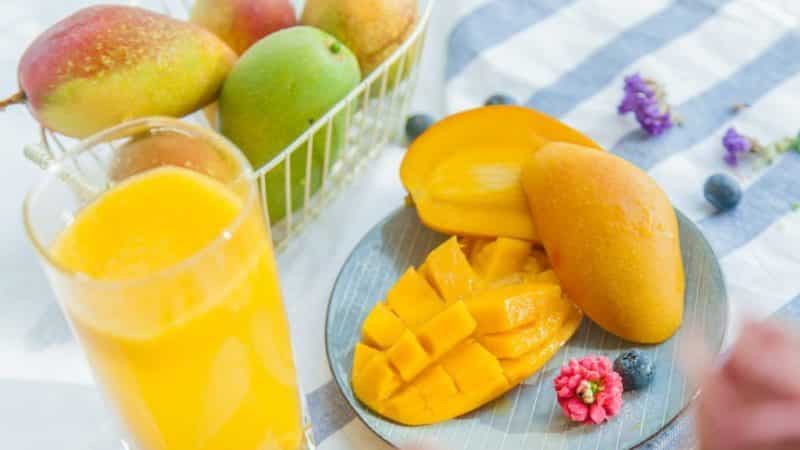
A woman’s body, even within a few weeks, undergoes a lot of changes that affect her well-being.
When consumed regularly, mango provides the following benefits:
- prevents the development of anemia that occurs against the background of heavy menstruation;
- relieves infections of the genitourinary system due to its diuretic effect;
- eliminates constipation caused by an increase in progesterone in the second phase of the cycle;
- normalizes the functioning of the nervous system, relieves tension;
- increases sexual desire and sensations during sexual intercourse;
- softens the manifestations of premenstrual syndrome, relieves cramps and pain;
- prevents the occurrence of breast cancer;
- improves the condition of hair and facial skin;
- reduces the manifestations of varicose veins;
- stabilizes blood pressure.
In addition to its benefits, mangoes can also cause harm.Its peel contains the toxic substance urushiol, which causes dermatitis upon prolonged contact with the delicate skin of women's hands. And the fruit itself, although rare, causes allergies in people with hypersensitivity, and also worsens the course of gastritis, if such a disease exists.
Attention! Unripe fruits provoke colic, irritation of the respiratory tract and mucous membranes of the digestive tract.
Medicinal properties for various diseases
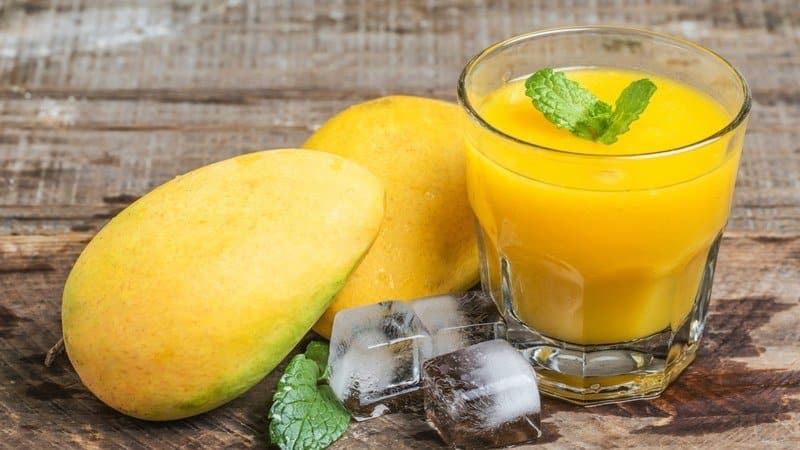
Mango can not only prevent the development of diseases, but also cure some of them:
- Atherosclerosis and high cholesterol levels. Eating this fruit daily for a month reduces cholesterol levels. This is due to the action of mangiferin, one of the main compounds in mangoes.
- Type 2 diabetes. Eating just half a fruit per day for 12 weeks lowers glucose levels to acceptable levels.
- Stones in the kidneys. According to an American study, vitamin B6 contained in mangoes helps dissolve oxalate stones.
- Anemia. Iron is well absorbed due to the high content of vitamin C.
- Autoimmune joint diseases. Inflammation in the joints is reduced by increasing the body's immune response. When mango is combined with glucocorticosteroids, there is an increase in the effect of the latter and rapid positive dynamics.
Read also:
Is it possible to eat potatoes if you have high cholesterol?
How to take buckwheat with kefir in the morning if you have diabetes
What are the benefits of celery root and how to use it correctly
Contraindications
Contraindications for eating mango include:
- presence of hypersensitivity to cashew nuts, pistachios and latex;
- history of seizures or cardiac arrest, which may recur due to the large amount of potassium in the fruit;
- impaired renal function;
- exacerbation of duodenitis, colitis, gastritis, enteritis, gastric and duodenal ulcers;
- alcohol intoxication - substances contained in fruits slow down the removal of ethanol from the body, which can lead to long-term intoxication;
- pancreatitis;
- migraine.
In what form and quantity to eat to get maximum benefit?

You should start your first acquaintance with mango with a small piece, increasing the daily dose to one fruit weighing 200-300 g.
To get maximum benefits, this fruit is best eaten raw, without cooking or mixing with other foods. Before eating, it is recommended to cool the mango, then it will become tastier and quench your thirst.
Mango for women during pregnancy

The rich vitamin and mineral composition of mangoes will undoubtedly benefit a pregnant woman and her unborn child.
Benefits during pregnancy:
- vitamin A improves the functioning of the placenta, participates in the formation of visual organs and fetal tissues;
- folic acid prevents cleft palate and impaired neural tube formation in a child;
- Vitamin C improves immunity, protects against infections and cell oxidation;
- B vitamins reduce the manifestations of toxicosis;
- magnesium reduces uterine hypertonicity and normalizes sleep;
- iron – prevention of anemia;
- potassium prevents the appearance of edema, stabilizes the water balance in tissues;
- pectin and fiber normalize the functioning of the gastrointestinal tract and eliminate constipation.
Due to the exotic nature of the fruit, it is better to consume it with caution, 50-100 g per day, so as not to provoke an allergy.If you experience any discomfort in the stomach, such as heartburn or nausea, it is better to avoid this fruit.
When breastfeeding
After childbirth during breastfeeding, the woman’s body is exhausted, and the baby needs nutrients and vitamins.
The benefits of mango in this situation are obvious:
- potassium improves milk production;
- dietary fiber normalizes stool not only for the mother, but also for the child;
- natural sugars restore energy wasted during childbirth and feeding;
- vitamins E, C, A, omega-3 have a positive effect on the immune system;
- lutein and zeaxanthin contribute to the development of a child's vision.
If a rash appears in a baby, it is better to replace mangoes with less allergenic fruits.
This is interesting:
What is chard, how to eat it correctly and how it can be useful
Do oranges help with weight loss and is it possible to gain weight from them?
What are the benefits of fruit for hair?

When consumed regularly, mango makes hair shiny and scalp healthy. Vitamins A and E nourish the epidermis, hair becomes less dry, acquires an attractive appearance, and dandruff disappears.
Vitamin E also improves blood circulation, and more nutrients begin to flow to the hair follicles. As a result, hair falls out less and grows faster.
Thanks to the high content of vitamin C, the production of collagen, the main building protein included in the hair structure, is accelerated. If there is enough of it, the hair becomes elastic, stops breaking and splitting at the ends.
Skin

In 2013, scientists from Korea discovered that mango extract reverses the signs of skin aging caused by ultraviolet radiation. Vitamin A accumulates, stops photochemical reactions in the skin, and it begins to look younger.
Retinol also regulates the functioning of the sebaceous glands, reduces sebum secretion, and accelerates skin recovery and regeneration. Blackheads, pimples and blemishes gradually disappear.
For the best effect, mango can not only be eaten, but also made into masks. They make the skin moisturized and elastic. And polyphenols contained in fruit pulp prevent the development of skin cancer.
For weight loss
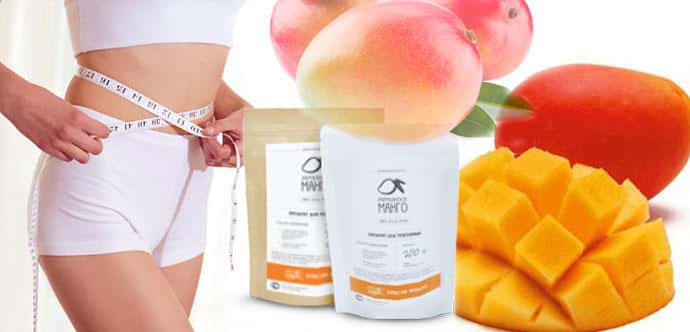
The mango diet is effective, but it lasts only 2-3 days. It is enough to eat 3-4 ripe fruits per day and drink 2-3 glasses of milk.
Due to low calorie content and such properties as improved digestion and rapid removal of fluid from the body, extra pounds disappear without harm to health.
Application in cosmetology
In cosmetology, masks are made from mangoes to moisturize, nourish, and combat excess fat and rashes on the facial skin.

Anti-rash mask:
- Mix 5 g of yeast, 15 g of mango pulp and 5 ml of white wine.
- Apply a thick layer to the skin and leave for 20 minutes.
- Rinse off and apply zinc ointment to acne.
Nourishing mask:
- Mix 10 g rice starch, 5 ml mango butter and 5 ml kelp extract.
- Apply to facial skin, leave for 30 minutes.
- Rinse with water.
Purifying mask:
- Mix 10 g of mango and the pulp of 2 strawberries, add 5 ml of liquid mint extract.
- Avoiding the eyelids and lips, apply to face and leave for 25 minutes.
- Wash with chamomile water.
If a burning sensation occurs, quickly rinse off the mask with water.
This is interesting:
What are the benefits of sauerkraut juice for the face and how to prepare various masks with it?
Rules for selection, storage and use
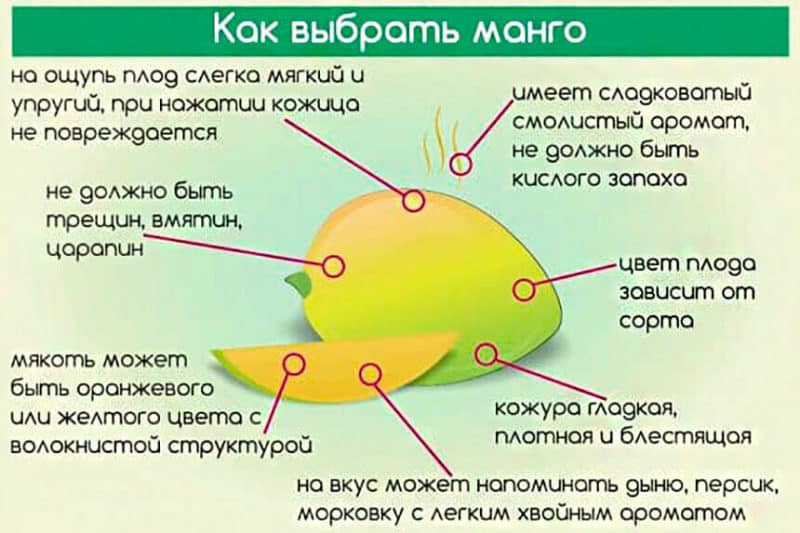
Mangoes come in green, red, yellow and black colors depending on the variety.Good, ripe fruit It has a sweet aroma and is slightly soft to the touch. The peel is dense, smooth, without damage or stains, does not burst when pressed, and the pulp returns to its previous shape. Normal fetal weight is 200-300 g.
Storage Features:
- ripe fruit can be kept at room temperature for no more than two days;
- unripe store mangoes in a paper bag a week before ripening and 2-3 days after;
- Sprinkle the cut fruit with lemon juice, wrap in cling film and store in the refrigerator for no more than a day;
- To freeze, peel the fruit, cut into cubes, put in a bag and place in the freezer for no longer than three months.
Before eating, mangoes should be washed with soap, cut in half and the pit removed. Then cut the pulp into a mesh without damaging the skin, turn it inside out to make a “hedgehog” and remove the cubes with a spoon. It is also permissible to simply remove the peel with a vegetable peeler and eat the fruit like an apple, nibbling the flesh around the seed.
Important! When washing and cleaning the fruit, it is advisable to use gloves to avoid the occurrence of dermatitis. It is caused by oily toxins contained in the peel.
Conclusion
The nutritional value and chemical composition of mangoes allow it to be used during periods of vitamin deficiency, pregnancy and breastfeeding in the absence of allergies. This sweet fruit also helps lower cholesterol, dissolve kidney stones, cure anemia, reduce inflammation in joints and lose extra pounds without a long and exhausting diet.